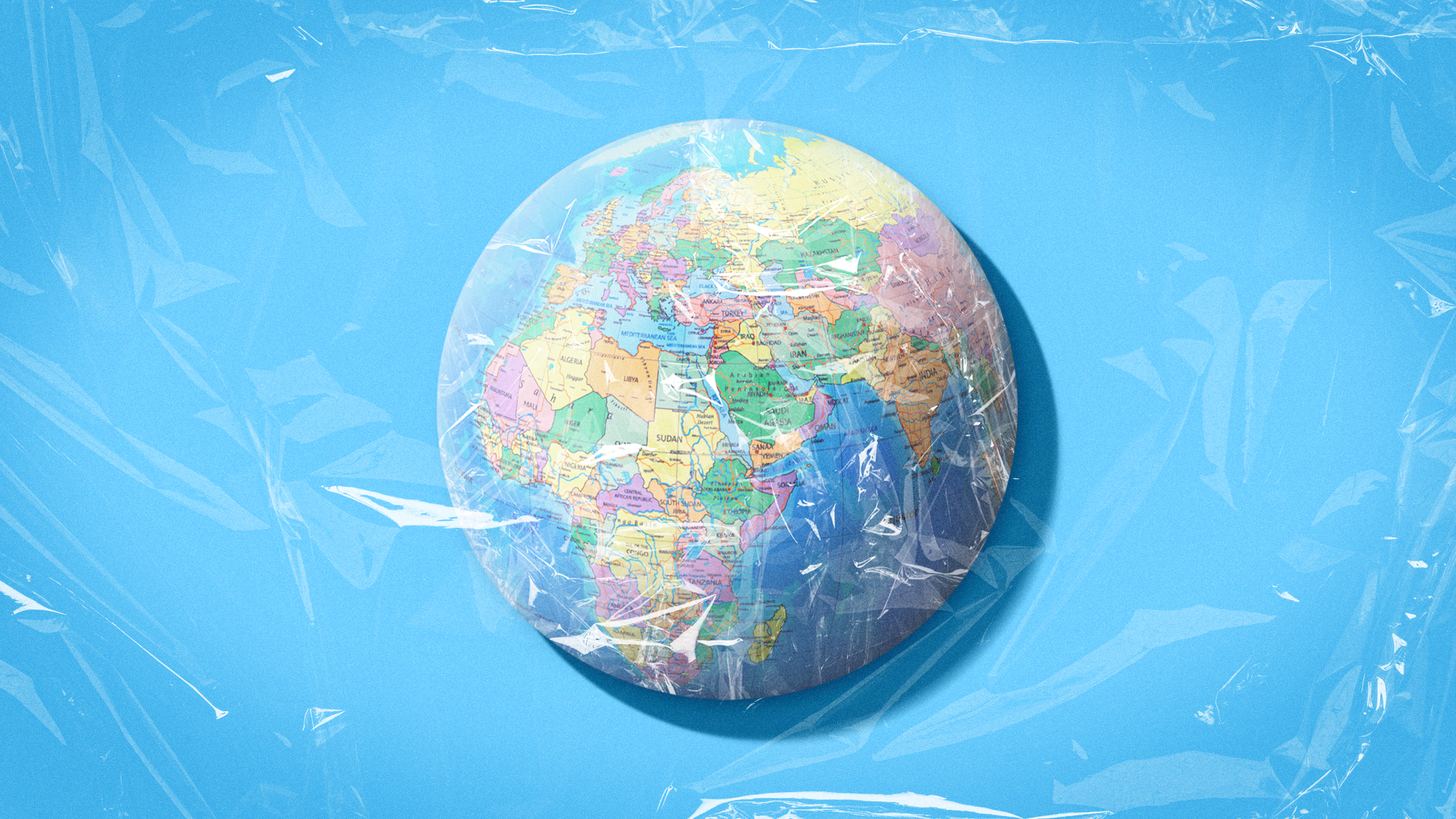Why is the world so divided over plastics?
UN talks on a first global plastic treaty are going down to the wire as fossil fuel companies, petrostates and the plastic industry resist a legal cap on production

A free daily email with the biggest news stories of the day – and the best features from TheWeek.com
You are now subscribed
Your newsletter sign-up was successful
In 2022, with annual plastic production reaching nearly half a million tonnes, many countries came to an agreement that only a global effort could tackle the problem.
Those 175 nations committed to creating the first legally binding treaty on plastics pollution by the end of 2024. But the fifth round of UN-led talks, held in South Korea last year, "fell apart" when fossil fuel producing nations "blocked" an attempt to limit production, said the Financial Times.
Today, delegates are gathering in Geneva for another shot at the fifth meeting of the UN Intergovernmental Negotiating Committee for Plastics (INC-5.2), to try to "get a deal over the line", said the BBC. But resistance from powerful petrostates and fossil fuel companies casts doubt over the chance of reaching a consensus.
The Week
Escape your echo chamber. Get the facts behind the news, plus analysis from multiple perspectives.

Sign up for The Week's Free Newsletters
From our morning news briefing to a weekly Good News Newsletter, get the best of The Week delivered directly to your inbox.
From our morning news briefing to a weekly Good News Newsletter, get the best of The Week delivered directly to your inbox.
What did the commentators say?
"Plastics are a grave, growing and under-recognised danger to human and planetary health," a team of experts warned ahead of the conference. Just three chemicals widely used in plastics cause more than $1.5 trillion (£1.1 trillion) in health-related damages every year, said the review in The Lancet. The key culprit: the explosion in plastic production.
This week, the so-called "High Ambition Coalition" of more than 100 countries (including the UK) is arguing for "a full lifecycle approach" with legal global limits on plastic production and "phasing out toxic chemicals", said Euronews.
But there is strong opposition from oil-producing nations as 99% of plastic is made from fossil fuels. The "like-minded countries", led by Saudi Arabia and including Russia, China, Iran and the US, want a voluntary treaty focused on waste management, especially recycling – although, according to a 2022 report by the OECD, less than 10% of plastic is recycled, thanks to costs and lack of infrastructure.
But the "major petrostates" argue that there is no need to limit production if the end product is tackled. That might be because global oil demand is "expected to peak in the next few years", said the BBC, amid the push towards renewable energy. That could "leave plastic as one of the few growth markets for the oil industry", which means any efforts to limit production could "pose short-term economic damage to the petrostates".
A free daily email with the biggest news stories of the day – and the best features from TheWeek.com
Insiders have also described a "total infiltration" of the negotiations by "vested industrial interests and corporate lobbyists", said The Guardian. They say polluters are "exerting too much power, not just within the negotiations but also within the UN Environment Programme (Unep), which oversees the negotiations". One source said they were "horrified" by the industry's influence, calling it "corporate capture".
A "flood" of lobbyists are attending this week's talks, "far outnumbering" delegations and scientists, to assist petrostates in "blocking" the cap on plastic production. The problem is that industry players have "deep pockets and clear financial interests", while smaller countries and NGOs cannot afford to send delegates.
Saudi Arabia, the world's second biggest oil producer behind the US and – via its state-owned oil company Aramco – owner of Sabic, one of the world's biggest producers of plastic, "stands out as a block" to an effective treaty. It has a "close relationship" with Unep and is a massive donor.
A new report by Greenpeace UK argued that the world's largest fossil fuel and petrochemical companies are also working to "derail" the treaty. Corporations like ExxonMobil, Shell, INEOS and Dow are "lobbying heavily to weaken" it, while simultaneously expanding production and making "staggering profits".
"There is a fundamental contradiction at the heart of the global plastics treaty negotiations: the same fossil fuel and petrochemical companies that profit from plastic pollution are being allowed to shape the treaty designed to end it."
What next?
With plastic production possibly tripling by 2060, a global treaty represents "our best – and possibly only – chance to change course", said Greenpeace.
Most UN agreements are reached by consensus – but that "no longer seems likely" in this case, said Mongabay. The summit's outcome "remains highly uncertain", especially as the oil- and plastic-producing countries have effectively vetoed majority agreements.
There is little hope of winning over petrostates, even "moderate" ones like Brazil, on a "virgin plastic production cap" – especially as the Trump administration is "generally opposed to global environmental agreements", said the FT. But there is "more widespread support" for phasing out chemicals harmful to humans. The health angle is "expected to play a large role" in the talks.
Harriet Marsden is a senior staff writer and podcast panellist for The Week, covering world news and writing the weekly Global Digest newsletter. Before joining the site in 2023, she was a freelance journalist for seven years, working for The Guardian, The Times and The Independent among others, and regularly appearing on radio shows. In 2021, she was awarded the “journalist-at-large” fellowship by the Local Trust charity, and spent a year travelling independently to some of England’s most deprived areas to write about community activism. She has a master’s in international journalism from City University, and has also worked in Bolivia, Colombia and Spain.
-
 What is the endgame in the DHS shutdown?
What is the endgame in the DHS shutdown?Today’s Big Question Democrats want to rein in ICE’s immigration crackdown
-
 ‘Poor time management isn’t just an inconvenience’
‘Poor time management isn’t just an inconvenience’Instant Opinion Opinion, comment and editorials of the day
-
 Bad Bunny’s Super Bowl: A win for unity
Bad Bunny’s Super Bowl: A win for unityFeature The global superstar's halftime show was a celebration for everyone to enjoy
-
 The environmental cost of GLP-1s
The environmental cost of GLP-1sThe explainer Producing the drugs is a dirty process
-
 The plan to wall off the ‘Doomsday’ glacier
The plan to wall off the ‘Doomsday’ glacierUnder the Radar Massive barrier could ‘slow the rate of ice loss’ from Thwaites Glacier, whose total collapse would have devastating consequences
-
 Can the UK take any more rain?
Can the UK take any more rain?Today’s Big Question An Atlantic jet stream is ‘stuck’ over British skies, leading to ‘biblical’ downpours and more than 40 consecutive days of rain in some areas
-
 As temperatures rise, US incomes fall
As temperatures rise, US incomes fallUnder the radar Elevated temperatures are capable of affecting the entire economy
-
 The world is entering an ‘era of water bankruptcy’
The world is entering an ‘era of water bankruptcy’The explainer Water might soon be more valuable than gold
-
 Climate change could lead to a reptile ‘sexpocalypse’
Climate change could lead to a reptile ‘sexpocalypse’Under the radar The gender gap has hit the animal kingdom
-
 The former largest iceberg is turning blue. It’s a bad sign.
The former largest iceberg is turning blue. It’s a bad sign.Under the radar It is quickly melting away
-
 Why the Middle East is obsessed with falcons
Why the Middle East is obsessed with falconsUnder the Radar Popularity of the birds of prey has been ‘soaring’ despite doubts over the legality of sourcing and concerns for animal welfare